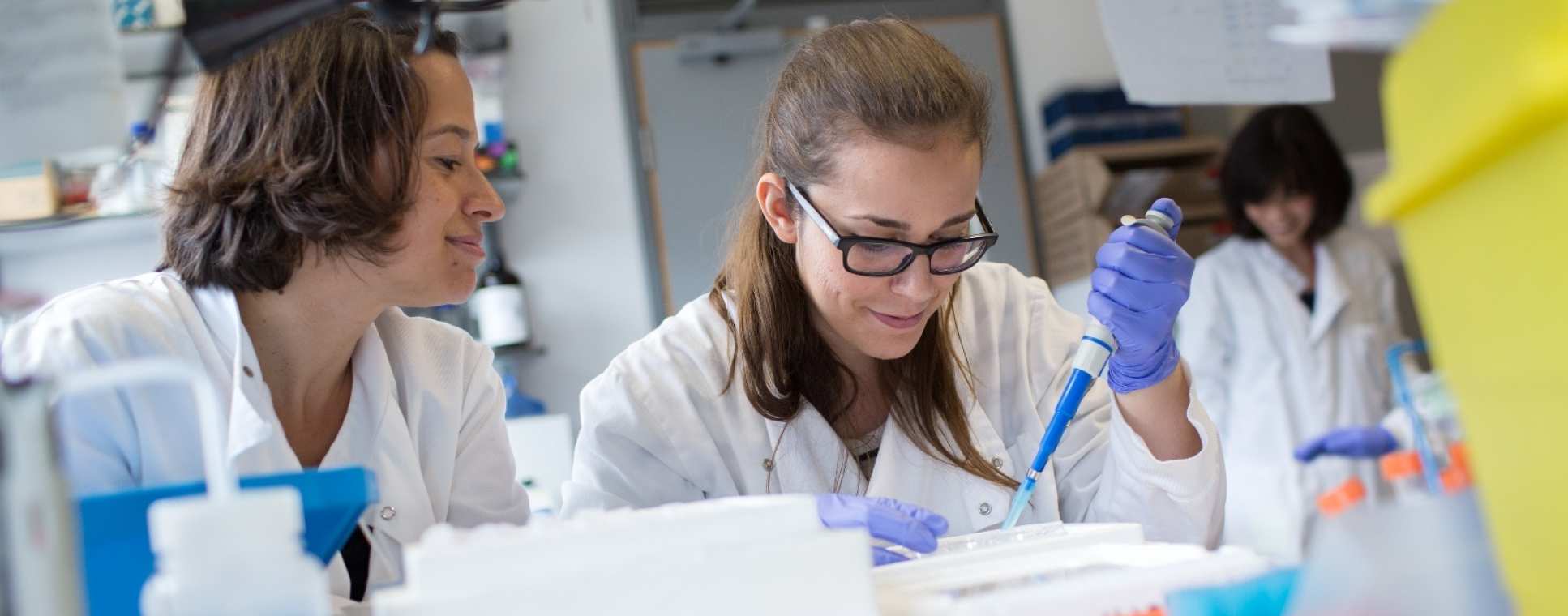
Contact
For more information or to collaborate, please contact:
Professor Iain McNeish
+44 (0)207 59 42185
i.mcneish@imperial.ac.uk
What we do
Ovarian research at Imperial is broadly encompassed into the following themes, which form the basis of the work carried out in the Ovarian Cancer Action Research Centre (OCARC):
- Risk and Prevention - exploring methods to detect and diagnose ovarian cancer early
- Tumour Development and Progression – investigating the biological differences between normal and cancer cells in terms of mechanisms and cell processes
- Heterogeneity and Drug Resistance – understanding why ovarian cancer comes back and how we can prevent or reverse this problem
- Precision Medicine – investigating novel targeted therapies that identify and attack cancer cells while doing little damage to normal cells
- Survivorship – addressing awareness and education into quality of life for patients after cancer treatment
Why it is important
Ovarian cancer is the leading cause of gynaecological cancer death in the developed world, exacerbated by a lack of effective screening, reliable enough to use to pick up the cancer at an early stage. Ovarian cancer symptoms are often vague and not always easy to identify, resulting in over three-quarters of patients being diagnosed at an advanced stage, where long-term survival rates are low.
Although improvements have been made in survival with surgical intervention and chemotherapy, it is thought that a small group of cancer cells exist in a given tumour that are resistant to chemotherapy, and that these cells are responsible for the subsequent recurrence of the disease, thus highlighting the need for better, more effective treatments.
How it can benefit patients
Our research programme seeks to tackle ovarian cancer across all stages of the cancer patient’s journey, from early detection; screening and diagnosis; treatment; and survivorship and long-term management of the disease.
Our primary focus is to ‘translate’ our laboratory research to have direct patient benefit, i.e. from ’bench to bedside’, progressing discoveries to the clinic as efficiently as possible, and achieving improvement in prognosis for patients with ovarian cancer, through personalised approaches.
Summary of current research
- Understanding the problem of drug resistance in ovarian cancer, a major cause of low survival in women with the disease
- Investigating early detection and prevention in ovarian cancer, examining factors that may enable a better assessment of ovarian cancer risk
- Understanding how tumour suppressors may be involved in the development of ovarian cancer, and how this information may be used in potential treatments for the disease
- Understanding the problem of intra-tumoural heterogeneity of ovarian cancer, i.e. variation within a single patient’s tumour
- Surgical and engineering approaches towards the development of real-time diagnostics for the treatment of ovarian cancer
- Investigating how the body’s immune system may be harnessed to treat ovarian cancer
- Understanding the epigenetic changes in ovarian cancer, and how these may be targeted in potential treatments
- Discovery of biomarkers that may inform about prognosis or response to treatment
- Utilising bioinformatics to unravel the complex biology of ovarian cancer
- Addressing survivorship and important factors in the long-term management of the disease
- Developing a portfolio of clinical trials and translational studies towards the personalised treatment of ovarian cancer
Lead researchers and their groups
Professor Robert Brown
/prod01/channel_3/media/migration/faculty-of-medicine/Robert-Brown--tojpeg_1564584994633_x4.jpg)
Professor Robert Brown
Epigenetics
Dr Ana Costa-Pereira
/prod01/channel_3/media/migration/faculty-of-medicine/Ana-Costa-Pereira--tojpeg_1564585027602_x4.jpg)
Dr Ana Costa-Pereira
Cytokines and Cancer Cell Signalling
Dr Paula Cunnea
/prod01/channel_3/media/images/people-list/Picture1--tojpeg_1485258648329_x1.jpg)
Dr Paula Cunnea
Advanced Research Fellow
Dr James Flanagan
/prod01/channel_3/media/migration/faculty-of-medicine/James-Flanagan--tojpeg_1564585073193_x4.jpg)
Dr James Flanagan
Translational Epigenomics
Professor Christina Fotopoulou
/prod01/channel_3/media/migration/faculty-of-medicine/ChristinaFotopoulou--tojpeg_1468936841656_x4.jpg)
Professor Christina Fotopoulou
Ovarian Cancer Tumor Heterogeneity and Bioengineering
Dr Matthew Fuchter
/prod01/channel_3/media/migration/faculty-of-medicine/Matt--tojpeg_1480423220661_x4.jpg)
Dr Matthew Fuchter
Reader in Chemistry
Professor Sadaf Ghaem-Maghami
/prod01/channel_3/media/migration/faculty-of-medicine/Sadaf-Ghaem-Maghami--tojpeg_1579532314796_x4.jpg)
Professor Sadaf Ghaem-Maghami
Professor of Gynaecological Oncology
Professor Hector Keun
/prod01/channel_3/media/migration/faculty-of-medicine/Hector-Keun--tojpeg_1564585157130_x4.jpg)
Professor Hector Keun
Cancer Metabolism and Systems Toxicology
Dr Jonathan Krell
/prod01/channel_3/media/migration/faculty-of-medicine/Jonathan-Krell--tojpeg_1564585670341_x4.jpg)
Dr Jonathan Krell
Molecular Oncogenetics
Professor Iain McNeish
/prod01/channel_3/media/migration/faculty-of-medicine/IAMcN_photo--tojpeg_1563793701187_x4.jpg)
Professor Iain McNeish
Ovarian
Dr Anke Nijhuis
/prod01/channel_3/media/migration/faculty-of-medicine/Anke-Nijhuis1--t_1570536622203_x1--tojpeg_1572978018700_x4.jpg)
Dr Anke Nijhuis
Imperial College Research Fellow
